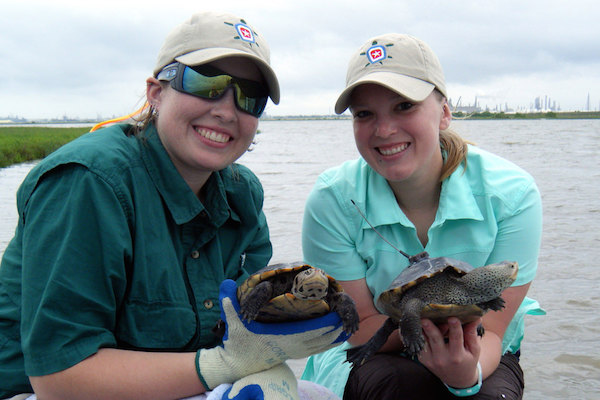
Senior marine biology majors Shantel Swierc and Lindsey Ramirez at work in the field on their recently honored research projects with Texas diamondback terrapins. Courtesy photo
Research presented in the Terrapin Times reaped big benefits for two graduate students in the Center for Coastal Studies program at Texas A&M University-Corpus Christi. Shantey Swierc and Lindsey Ramirez were recently named as 2015 grant recipients of the Diamondback Terrapin Working Group. Both are seniors majoring in marine biology.
The Terrapin Times is the official newsletter of the Diamondback Terrapin Working Group, which grants the awards. Recipients were awarded for their individual educational projects involving conservation and management of terrapins.
Swierc’s research involved the demographics, distribution and genetic variation in the Texas diamondback terrapin within the Corpus Christi and Aransas bay systems. Her work will provide critical information on the population genetics and dynamics of the Texas diamond terrapin in the Coastal Bend region, benefiting regulatory and conservation managers. She received a $500 grant to help fund her research.
“My favorite thing about working with diamondback terrapins is the opportunity I get to educate the public about this fantastic species that many may not know about,” Swierc said. “Seeing people light up when they see us working with them is the best award you can receive.”
Ramirez’s study will determine the physiological effects of elevated salinity on stress hormone production in terrapins living in Nueces and Mission-Aransas estuaries. Her research is expected to provide baseline data in management practices for terrapin populations along the South Texas coast, where little research has been conducted on the topic. The data should help assess freshwater inflow requirements needed to maintain a healthy coastal ecosystem.
Ramirez received $300 from the grant program to help fund her project.
“I love the fact that terrapins have such an amazing personality, and I am grateful that I get be an advocate for the Texas subspecies,” Ramirez said. “Little information is known about their populations, and many people do not realize they even exist.”
Since 2009, the terrapin grant program has awarded more than $14,000 to fund 26 projects, leading to 19 peer-reviewed publications, graduate student theses and dissertations. The program is funded solely by membership contributions.
The Diamondback Terrapin Working Group was formed in 2004 by individuals from academic, scientific, regulatory and private institutions working to promote the conversation of the diamondback terrapin along with the preservation of intact, wild terrapin populations and their ecosystems.





